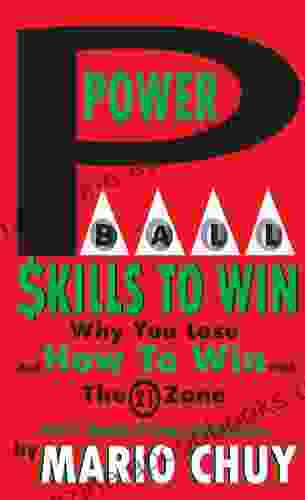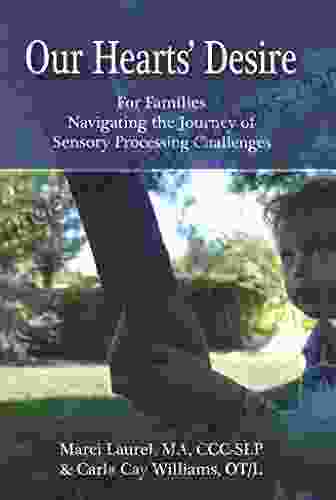Navigating the Journey of Sensory Processing Challenges for Families

Sensory processing challenges can be a confusing and overwhelming experience for both children and their families. These challenges can affect a child's ability to interact with their environment, learn, and participate in everyday activities. For families, it can be difficult to know how to help their child and where to turn for support.
4.5 out of 5
| Language | : | English |
| File size | : | 462 KB |
| Text-to-Speech | : | Enabled |
| Screen Reader | : | Supported |
| Enhanced typesetting | : | Enabled |
| Word Wise | : | Enabled |
| Print length | : | 174 pages |
| Lending | : | Enabled |
This guide is designed to provide families with the information and resources they need to navigate the journey of sensory processing challenges. We will discuss what sensory processing is, how it affects children, and what families can do to help their child succeed.
What is Sensory Processing?
Sensory processing is the way our brains receive and interpret information from our senses. This includes our sense of touch, sight, hearing, smell, and taste. When sensory processing is working properly, we are able to use our senses to interact with our environment and learn about the world around us.
However, for children with sensory processing challenges, their brains may not be able to process sensory information in a typical way. This can lead to a variety of symptoms, including:
- Hypersensitivity to certain sensory stimuli, such as bright lights, loud noises, or strong smells
- Hyposensitivity to certain sensory stimuli, such as pain or temperature
- Difficulty with sensory integration, which is the ability to combine information from different senses to form a meaningful experience
- Difficulty with motor planning and coordination
- Behavioral problems, such as aggression, tantrums, or withdrawal
How Sensory Processing Challenges Affect Children
Sensory processing challenges can affect children in a variety of ways. These challenges can impact a child's ability to:
- Learn and develop new skills
- Interact with their peers and family members
- Participate in everyday activities, such as eating, sleeping, and playing
- Manage their emotions and behavior
What Families Can Do to Help
If you think your child may have sensory processing challenges, there are a number of things you can do to help. The first step is to talk to your child's doctor or a qualified occupational therapist. They can assess your child's sensory processing skills and recommend strategies to help them cope with their challenges.
There are a variety of strategies that can be used to help children with sensory processing challenges. These strategies may include:
- Sensory diets
- Sensory integration therapy
- Behavioral therapy
- Medication
The best approach for each child will vary depending on their individual needs. It is important to work with a qualified professional to develop a treatment plan that is tailored to your child's specific needs.
Resources for Families
There are a number of resources available to families of children with sensory processing challenges. These resources can provide information, support, and guidance.
- The Sensory Processing DisFree Download Foundation
- The National Institute of Child Health and Human Development
- The American Occupational Therapy Association
- The American Speech-Language-Hearing Association
- The Council for Exceptional Children
Navigating the journey of sensory processing challenges can be a challenging experience for families. However, with the right information and support, families can help their child succeed. By working together, families can create a supportive and nurturing environment that will help their child reach their full potential.
4.5 out of 5
| Language | : | English |
| File size | : | 462 KB |
| Text-to-Speech | : | Enabled |
| Screen Reader | : | Supported |
| Enhanced typesetting | : | Enabled |
| Word Wise | : | Enabled |
| Print length | : | 174 pages |
| Lending | : | Enabled |
Do you want to contribute by writing guest posts on this blog?
Please contact us and send us a resume of previous articles that you have written.
 Book
Book Novel
Novel Page
Page Chapter
Chapter Text
Text Story
Story Genre
Genre Reader
Reader Library
Library Paperback
Paperback E-book
E-book Magazine
Magazine Newspaper
Newspaper Paragraph
Paragraph Sentence
Sentence Bookmark
Bookmark Shelf
Shelf Glossary
Glossary Bibliography
Bibliography Foreword
Foreword Preface
Preface Synopsis
Synopsis Annotation
Annotation Footnote
Footnote Manuscript
Manuscript Scroll
Scroll Codex
Codex Tome
Tome Bestseller
Bestseller Classics
Classics Library card
Library card Narrative
Narrative Biography
Biography Autobiography
Autobiography Memoir
Memoir Reference
Reference Encyclopedia
Encyclopedia Hilde F Johnson
Hilde F Johnson Josh Tech
Josh Tech M Sasinowski
M Sasinowski Hayley Shaver
Hayley Shaver Kieth A Carlson
Kieth A Carlson Isabela Mares
Isabela Mares Red Mikhail
Red Mikhail Kate Mosse
Kate Mosse Paul Owens
Paul Owens Ilya Yablokov
Ilya Yablokov Train River
Train River Sybil Sharpe
Sybil Sharpe Haley Lukas
Haley Lukas Jenna Arnold
Jenna Arnold Ivy Pembroke
Ivy Pembroke Ilan Bendelman
Ilan Bendelman Robert X Browning
Robert X Browning M D Johnson
M D Johnson Helen Prejean
Helen Prejean Hannah West
Hannah West
Light bulbAdvertise smarter! Our strategic ad space ensures maximum exposure. Reserve your spot today!

 Harold PowellUnlock the Rhythms of Africa: 35 Traditional African Songs for Tongue Drum...
Harold PowellUnlock the Rhythms of Africa: 35 Traditional African Songs for Tongue Drum... Jake PowellFollow ·18.5k
Jake PowellFollow ·18.5k Zachary CoxFollow ·12k
Zachary CoxFollow ·12k Colin FosterFollow ·10.8k
Colin FosterFollow ·10.8k Seth HayesFollow ·9.1k
Seth HayesFollow ·9.1k John Dos PassosFollow ·17.2k
John Dos PassosFollow ·17.2k Anthony WellsFollow ·13.6k
Anthony WellsFollow ·13.6k Jason ReedFollow ·16.7k
Jason ReedFollow ·16.7k Ethan GrayFollow ·16.7k
Ethan GrayFollow ·16.7k

 Stanley Bell
Stanley BellUnlock the Secrets of Powerball Success: Master the...
Prepare to shatter the odds and transform...

 Ernest J. Gaines
Ernest J. GainesPatti Smith Horses 33 55: A Photographic Journey into a...
Journey into the raw and...

 Isaiah Price
Isaiah PriceMoyamoya Disease Diagnosis And Treatment: A Comprehensive...
Moyamoya Disease...

 Joseph Foster
Joseph FosterRecent Advances in Ophthalmology, Volume 14
Editor: [Editor's...
4.5 out of 5
| Language | : | English |
| File size | : | 462 KB |
| Text-to-Speech | : | Enabled |
| Screen Reader | : | Supported |
| Enhanced typesetting | : | Enabled |
| Word Wise | : | Enabled |
| Print length | : | 174 pages |
| Lending | : | Enabled |














